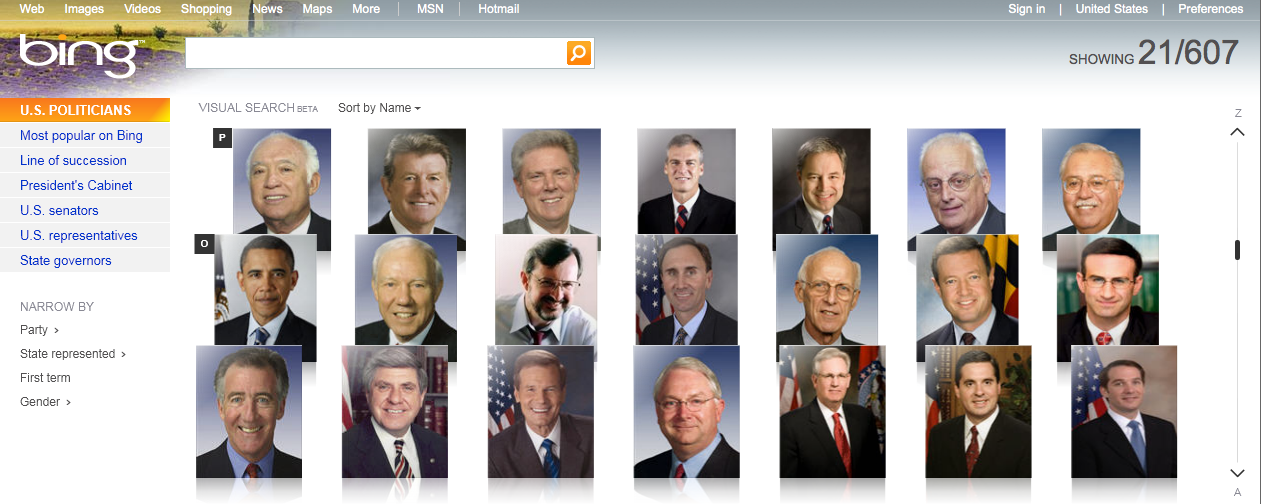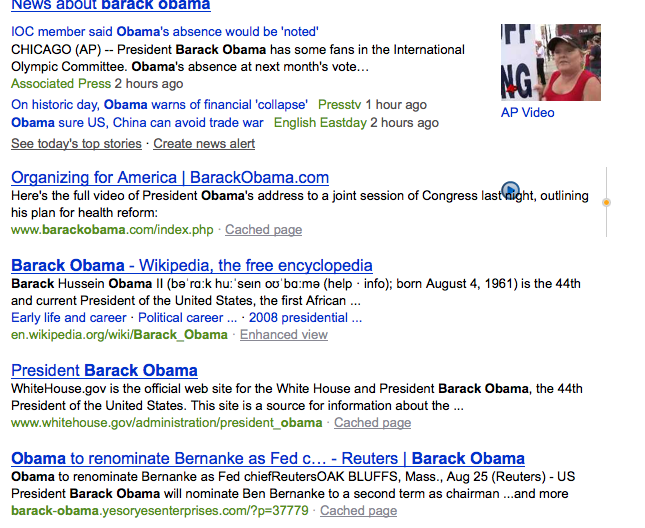Bing Visual Search is not a Revolution—It’s a Coup
“Why type when you can see it?”
Because I’m probably not a genius, and I’m definitely not a moron.
Bing’s visual search is doesn’t do anything useful. It doesn’t make your searches any easier, and it certainly doesn’t make it faster. It adds a layer of visual appeal, but even that appeal isn’t so appealing. For example, try searching for Obama in the list of US politicians, which they suggest as a good search. Here’s what I see:
(Click for a larger image)
Compare that to the normal Bing search results:
09.14.09Direct Marketing Gave Myspace Something No Other Social Network Had
You’ve probably passed Stealing MySpace in the bookstore a dozen times. Every time, you probably glanced at the title and moved on.
Which is too bad; it’s a terrible title for a terribly interesting book. Essentially, Tom Anderson and his merry band of spyware masters were able to build a site that, until quite recently, was the largest and most successful social network. They didn’t have a vision, they didn’t have any expertise, and one of their most compelling features started out as an unexpected accident.
Myspace had one huge advantage, though: while it’s founders weren’t spammers, they were about as close as you can get. Before Myspace, they pushed hidden cameras, ebooks on dating, and lots and lots of spyware. Myspace itself might have been an attempt to go legit, but it might well have been a campaign to harvest new emAil addresses that somehow got out of hand. Whatever the reason, Myspace’s direct marketing heritage made it a social site like no other.
09.11.09The Typo Test: Do Typos Ruin Online Copy? I’m Going to Find Out
There are two Typo Instincts.
On the one hand: Who cares about a single typo? If someone can’t spell (or run spellcheck), does that really mean they can’t do their job?
On the other hand: Who wants to work with someone who can’t even bother double-checking their first impressions?
I don’t know for sure if typos ruin online sales pitches, but I have a theory, and I’m going to test it.
09.10.09How to Write a Top-N List (If You Must)
Paul Graham has some not-especially-kind things to say about the list of n things. Read his essay, and the next time you encounter a top-n list, you’ll have a bad taste in your mouth.
But it’s been a few days since that article came out, and if you read it then, you’ve noticed by now—for a “degenerate case of essay,” they’re pretty popular among readers and writers.
They’re popular because they work. And here’s how to make them work best. Read the rest of this entry »
09.9.09Wikipedia and Amazon Own (Most) Proper Nouns
Amazon and Wikipedia own most of the world’s most valuable proper nouns. Try Googling any famous person, and you’ll get Wikipedia. Google any beloved book, and you’ll find Amazon—unless the book has been made into a movie, in which case you’ll end up with Amazon subsidiary IMDB. Read the rest of this entry »
09.6.09Claude Hopkins Would Have Loved Bittorrent
There are many second-best books about advertising. Ogilvy on Advertising will tell you all about how Ogilvy would have sold it; The Book of Gossage
can tell you how Gossage would have scolded you for selling too hard; but only Scientific Advertising
tells you how to think about advertising.
Even if you don’t sell things for a living, being a good judge of advertising is a pretty useful talent. With that in mind, I’ve reread Hopkins’ book every year or two, just to stay sharp. And this year, I noticed something startling: Hopkins, writing in 1923, would have loved software piracy. Read the rest of this entry »
| Posted in Advertising | No Comments »
Steganographic Typo-Based URL Shorteners: Add a Link With Zero New Characters
Watch out, j.mp! Back off, tinyarro.ws. You can shorten a URL down to zero characters by steganographically embedding it into the text. Think of it this way: how many potential typos could be autocorrected for a given sentence? You’ve got the off-by-one errors, like “typ[“, the random capitalization errors (“tYpo”), transpositions (“tyop”), and full-word off-by-ones (“yu[p”). The word “typo” alone has:
- 24 off-by-one-character potential typos.
- 9 random capitalization errors (discard all-caps and capitalize first letters).
- 3 transpositions.
- 6 full-word off-by-one errors.
This gives you 42 unique ways to misspell typo, and in all cases it’s fairly easy to determine that the original word was “typo.”
What I’d like to propose is a service that uses typos to encode URLs. You visit a site, input your tweet and URL, and get, as an output, a tweet with a strategically insert typo (or typos). Someone who sees this tweet can input the text into the site, and get the URL that’s mapped to that particular set of typos.
Imagine! Instead of reading something lame and garbled like:
@ev this is a neat microblogging service: http://bit.ly/xE2sK
You could say something clean and space-saving, like:
@ev yjod iS a neta micRolbohhing sevriCe:
Don’t think of it as transmitting 140 characters at a time—think of it as transmitting 1140 bits—meaning there are far, far more potential unique tweets than there are atoms in the universe.
(Note: I have no interest in implementing a steganographic URL shortener, but it might be an interesting exercise. It’s probably possible to have an effectively infinite number of embedable URLs without making things unreadable. Maybe adding some backend analytics could tell you which typos result in a click-through and which don’t. If anyone does anything like this, please let me know.)
09.4.09In Defense of the WWF 9/11 Ads: Good Ad, Wrong Client
This is terribly offensive, unless you happen to think it’s true. If it is true, the only offensive bit is that anyone would think that Tsunami deaths are okay. The problem isn’t the content of the ad: the problem is who paid for it. Read the rest of this entry »
| Posted in Advertising | No Comments »
Why Car Ads Waste So Much Money
Why do car company accounts make people so stupid? Where the Suckers Moon made me wonder. Everyone invoked knew how to make ads, sell cars, or both. And yet Wieden Kennedy made ads that sold no cars, and Subaru paid them well to do it.
| Posted in Advertising | 5 Comments »
Randall Rothenberg’s Where the Suckers Moon: A Story About Falling for Stories
Where the Suckers Moon is a story about trying to sell a decent product by turning it into a political movement. Or a hip trend. Or a trend-free anti-trend. Or beautifully-produced anti-art. It’s a story about finding roundabout ways not to get to the point.
In short, it’s a story about an award-winning ad agency that burned through millions of dollars trying to sell an attractively-priced, middle-of-the-road product as anything but that. If you’ve ever wanted to waste millions of dollars on someone’s flash of creative insight (or wished someone would waste millions on yours), you should read it. Read the rest of this entry »
| Posted in books | 1 Comment »


| Posted in technology | No Comments »